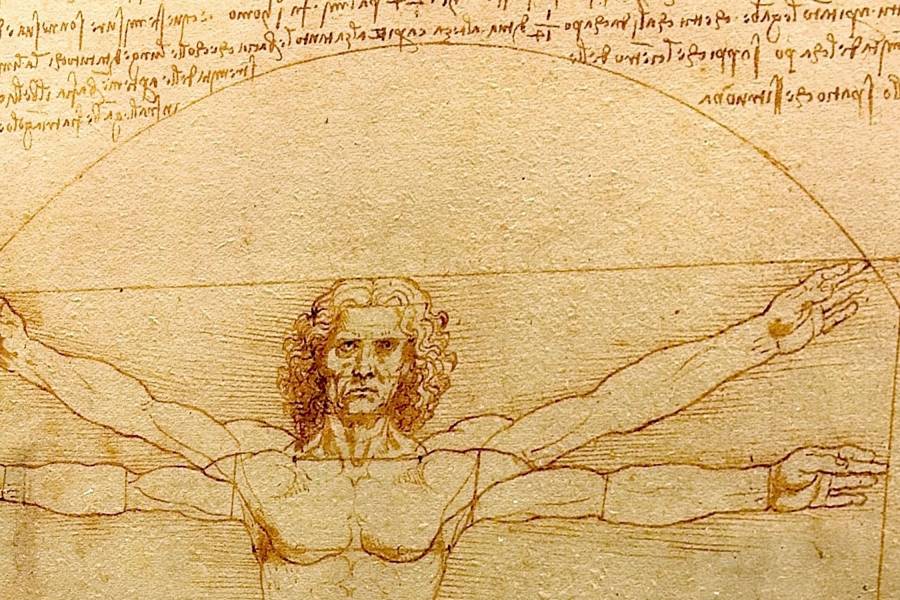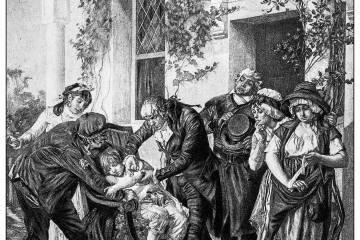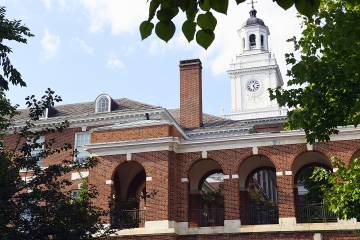Javier Jurado Vélez is looking forward to starting medical school this fall and already has ideas about what the practice of medicine may look like for him.
"I've always thought about the idea of making a community center, either within my own private clinic or wherever I'm working," says the Johns Hopkins senior. "Just an open area for people in the community to hang out, talk with each other, have lectures, or rent the space if they want to. That way they can come into the clinic outside of illnesses, and hopefully have a more positive experience."
The vision is one facet of the overall approach Jurado Vélez hopes to bring to medicine, which he says draws on his experience as a medicine, science, and humanities major. MSH is an interdisciplinary, humanities-based major using a cultural and historical context to explore scientific inquiry and the roots of medicine.
MSH gave him the flexibility to design his own path, Jurado Vélez says. The opportunity to take a large number of electives across a variety of departments allowed him to choose courses he was deeply interested in to meet the requirements. It also enabled him to build connections with students of all academic stripes. And it gave him a perspective that he believes will make him a better doctor.
"What I'm taking away from the program is an interdisciplinary mindset, in order to connect different areas of thought," Jurado Vélez says. "The way I process information from a class in biology is very different from doing readings for anthropology class, but I see sometimes how they might intersect. As someone who is hopefully becoming a physician and working with not only people but communities and different populations, having that humanities perspective of thinking more outside of an illness or treatment but rather of social determinants of health, or of how institutional racism might have a factor in the way that I might proceed, will be very useful."
The MSH major, which launched in 2015, quickly became one of the fastest-growing majors in the Krieger School of Arts and Sciences. Like Jurado Vélez, many students appreciate the opportunity to combine rigorous scientific training with the critical thinking that marks humanistic studies—not as parallel tracks, but in ways that intertwine, says physician and medical historian Jeremy Greene.
"The major is not a derivative form of either a science major or a humanities major, but should have symmetry, should have ways in which we understand how humanistic frames better allow for critical thinking in scientific, medical, and engineering careers," says Greene, who serves in the School of Medicine as a professor of medicine and the history of medicine, director of the Department of the History of Medicine, and founding director of the Center for Medical Humanities and Social Medicine.
Earlier this spring, Greene became interim chair of the major's advisory board, a body that guides its structure and content. At the same time, Nicole Labruto, assistant research professor in the Department of Anthropology, was named MSH's director of undergraduate studies.
The duo has large shoes to fill. Inaugural director Charles Wiener, professor of medicine and now president of Johns Hopkins Medicine International, set the major's tone from a lifelong commitment to the intersection of humanities and medicine, shaping the links between Hopkins' Homewood and East Baltimore campuses that continue to power MSH. Mitchell Merback, a professor in the Department of the History of Art, was MSH's next director. He and Elizabeth Patton, senior lecturer in the Alexander Grass Humanities Institute, created and taught a course on death and dying that became highly popular among students both inside and outside the major, and that created the MSH common denominator that Greene and Labruto plan to build upon.
Along with the rest of the advisory board, Greene and Labruto are focusing their efforts on more sharply defining the major's track system. In partnership with 16 of Krieger's departments and programs, MSH offers 16 tracks, designed for students to gain deep expertise in one discipline while also experiencing breadth in other areas.
Greene and Labruto are fortifying the sense of progression through each track. Students start with a 100-level introductory course that might, for example, cover death and dying; medicine and media; or science, medicine, and race, offering a taste of different kinds of humanistic approaches to scholarship. MSH's 200-level courses focus on theory and methods, and students begin to form the cohorts they will travel with through their senior year. Electives at the 300 level are where students dig deep into disciplines ranging from philosophy to bioethics to Near Eastern Studies. And a capstone course offers the chance to complete a significant independent research project showcasing knowledge within a disciplinary track as well as facility with interdisciplinary linkages.
Meanwhile, since the major's flexibility means that its students don't necessarily share classes and can graduate without much contact, Labruto and MSH's student advisory council are developing new programming to reinforce the major's sense of cohesion. They reinvigorated the weekly newsletter, and are planning to set up a Slack or Discord channel for students to connect with one another; to hold poster sessions for students to share their research with the public; and to create a seminar series featuring faculty from Hopkins and beyond.
Greene and Labruto see their mission as not so much increasing the major's already impressive growth, but more clearly defining MSH so that potential students grasp what it does and does not provide. For many students, Greene says, there is great value in developing expertise in a specific discipline, and the world needs graduates with that background. And there is also value in what this interdisciplinary major offers, in the experience of applying scientific approaches to humanistic questions, or critical thinking within the practice of medicine or public health.
"Studying the relationships between science and society is urgently necessary in the 21st century," Greene says. "We're at a moment in which the kinds of things that take place in a major that's explicitly focused on the intersection of medicine, science, and humanities are really becoming visible on a national if not international level. It's an exciting time for an undergraduate coming in to understand that this can be a very viable way to pursue their own liberal arts education and unique ability to build skills that will allow them to do independent research that will be applicable in several different possibilities of directions their future careers might take."
For both pre-health students and students of the humanities, MSH offers something that Labruto has been unable to find at other colleges or universities. "It's really exciting to know that students will have that humanistic training and will bring that to whatever medical profession they choose to pursue," she says. "That they'll have critical insight about history, about structural racism, about gender inequalities and disparities. They'll have a sense of cultural relativism, and ideally they'll understand social factors in a way that a straight scientific education doesn't necessarily provide."
The implications of such an education are far-reaching, Labruto adds.
"Having people with that kind of insight at the intersection of science and medicine and society will only make for a better medical system, a better scientific system," she says. "And then the other side: humanities scholars who can analyze science and medicine more broadly and articulate those connections and those histories."
Posted in Health, Arts+Culture, Science+Technology, Student Life











